Treatment
- Home
- >
- Treatment Options
- >
- Eating Right for Dialysis Patients
Eating Right for Dialysis Patients
A well-balanced diet, with the right amount of protein, calories, fluid, vitamins and minerals, is necessary for dialysis patients or patients with end stage kidney disease to stay fit as their kidneys are no longer functioning at its full capacity.
Remember to:
- Eat the right kind and right amount of food on a daily basis.
- Take medication according to the doctor’s prescription.
- Comply with their dialysis treatment, for instance, do not skip any dialysis session.
- Be physically active as possible.
Getting the Right Amount of Calories
- Getting the right amount of energy (calories) is important for overall health and well-being.
- The energy needs of every individual is different due to their age, gender, body size, physical activity level and medical conditions.
- For PD patients: The dialysate used provides extra calories in the form of carbohydrates (dextrose). You may need to reduce your daily carbohydrate intake to prevent excessive calorie intake.
- Do check with your dietitian or doctor about the calories contributed by the dialysate used.
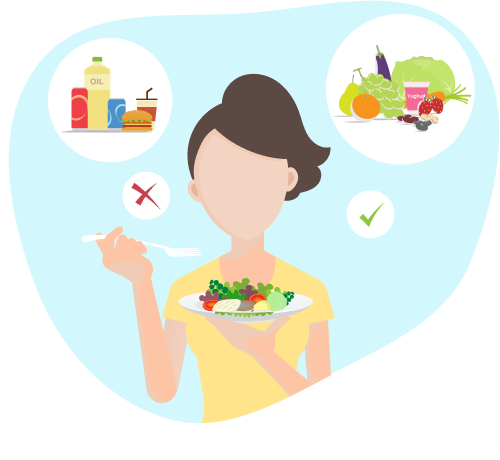
Adequate in Protein
- Protein is essential for building and repairing muscles.
- Dialysis patients require a higher protein intake as some amount of protein are lost during the dialysis treatment (PD and HD) process.
- Insufficient protein intake could result in weight loss, muscle wasting, reduced ability to fight infections and thus, leads to malnutrition.
- Protein can be divided into two categories: high and low quality.
- High-quality protein includes meat, poultry, fish and egg white.
- Most dairy products such as yogurt, milk, cheese and soy products also contain high-quality protein.
- The right kind and correct amount of protein is vital for dialysis patients to stay healthy.
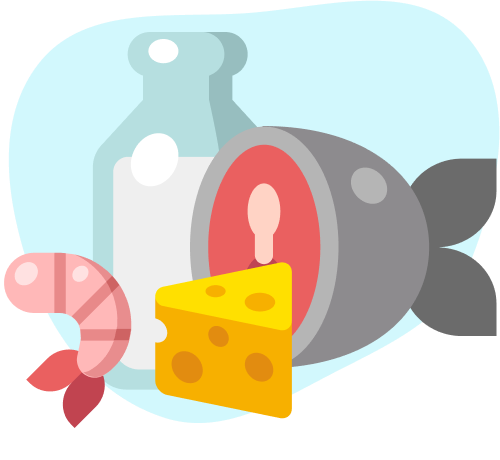
Important! Protein food contains phosphate. Dialysis patients must take their phosphate binders with ALL their meals.
Low In Phosphorus
- As the kidneys become less effective at filtering waste products, blood phosphate level rises.
- When phosphate begins to build up in the blood, calcium is drawn from the bone. The calcium phosphate product forms hard deposits in patient’s tissues leading to skin itchiness, joint pain, eye irritation and hardens their blood vessels. Over time, patients’ bones become weak and brittle. This leads to fractures and constant pain.
- Patients with prolonged high phosphate level are also at a higher risk of cardiovascular death due to the hardening of the blood vessels (vascular calcification).
- Both HD and PD patients need to control the amount of phosphate in their diet. Phosphate binders are prescribed to dialysis patients as this medicine will help to reduce the amount of phosphate being absorbed from food into their bloodstream.
- Avoid high phosphate foods such as:
- Dairy products (e.g. milk, cheese, yogurt)
- Bone-based soups (e.g. chicken feet and pork bone)
- Bean products (e.g. all forms of nuts, seeds, bean soup)
- Colas
- Cocoa and related products
- Malt drinks (e.g. Milo, Horlicks, Ovaltine)
- Processed food and canned food (e.g. canned meat, sausage, meat patty)
- Organ meats (e.g. liver, intestine)
- Canned sardines, anchovies (ikan bilis) and dried shrimp paste
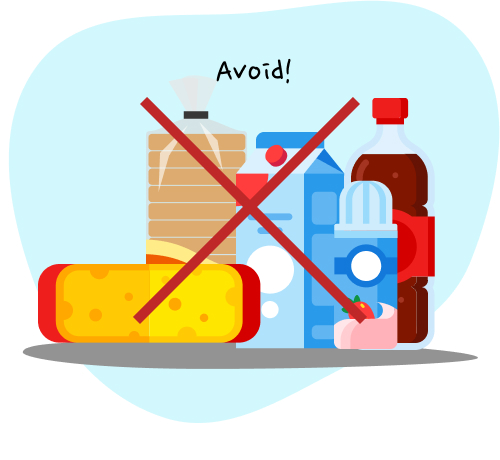
Potassium
- Potassium is a type of mineral which is important for the functioning of the nerves and muscles.
- Potassium needs to be maintained at a safe level in the blood. When potassium levels are too low or too high, it can be dangerous as it may result in cardiac arrest.
- Some signs and symptoms of low potassium level include muscle cramps, difficulty breathing and irregular heartbeat, while high potassium level can cause muscle weakness, abnormal heart rates and in extreme cases, heart failure.
- Potassium removal is more efficient in PD because patients undergo dialysis every day. In general, PD patients do not need to restrict potassium intake as strictly as HD patients.
- High level of potassium in blood may occur in HD patients and it can be life-threatening. HD patients need to limit potassium intake in their daily diet.
- Potassium is found mainly in fruits and vegetables, with considerable quantities found in nuts, dried beans and dairy products.
- Other high potassium foods are:
- Fruits and vegetables from the higher potassium group.
- Wholegrain cereals, bread and biscuit.
- Nuts, seeds and related products (e.g. chocolate, peanut butter).
- Coconuts and related products (e.g. coconut milk, kaya).
- All fresh/canned fruit and vegetable juice, herbal medicine drinks, strong tea/coffee, cocoa and malted beverage, milk, wine.
- Brown sugar, molasses, maple syrup, toffees, liquorice.
- High potassium salt substitute, bottled sauces, meat and vegetables extract, essence of chicken, stock cube.
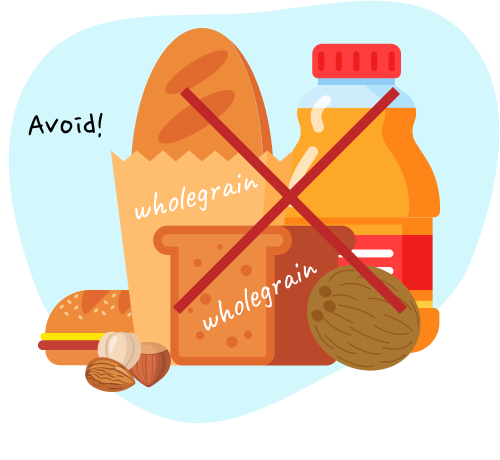
Tip! You can reduce the potassium content of vegetables by soaking vegetables that has been cut into smaller pieces in water for at least 2 hours.
Low in Sodium
- Sodium is naturally found in all types of foods, and more commonly in packaged and processed foods. Salt is one of the main sources of sodium.
- Sodium will increase thirst and will increase the tendency of drinking more fluid.
- As a result, weight gain from fluid arises and consequently, an increase in blood pressure, and added burden to the heart.
- Sodium restriction in kidney disease helps to maintain normal fluid balance.
- Tips to reduce sodium intake:
- Limit the amount of salt/sauces added during cooking.
- Avoid using stock cubes, meat and vegetable extracts e.g. Bovril and Marmite.
- Avoid using bottled chicken extracts.
- Read labels on processed foods and choose products that contain less than 120mg sodium per 100g of the food product.
- Minimise the consumption of canned and processed food. If you do choose to use them, do drain the brine.
- Use fresh herbs and whole spices to replace salt /sauces in cooking.
- Use fresh lime, lemon juice, or vinegar to flavour food.
Renal patients should exercise caution with salt substitutes as they are often high in potassium and should not be used without consulting your doctor or dietitian.
Control in Fluids
- Due to reduced kidney function, dialysis patients have reduced urine output. Therefore it is important for dialysis patients to adhere to their fluid restriction.
- Excess fluid is retained in the body and symptoms such as shortness of breath, high blood pressure and swelling of the legs can occur.
- Both PD and HD patients will need to consider their urine output, remaining kidney function and body size to determine their fluid intake.
- PD patients will also need to monitor the amount of fluid removed during an exchange.
- HD patients may keep track of weight gain in between two dialysis sessions as a gauge.
- Daily allowance for fluid intake can vary from 500ml to 1,000 ml per day, depending on the patient’s urine output.
- The daily fluid allowance includes plain water, tea, coffee, milk, gravy, soup, and porridge. Other fluids that are liquid at room temperature such as ice-cube, ice cream, jellies are also considered as fluid.
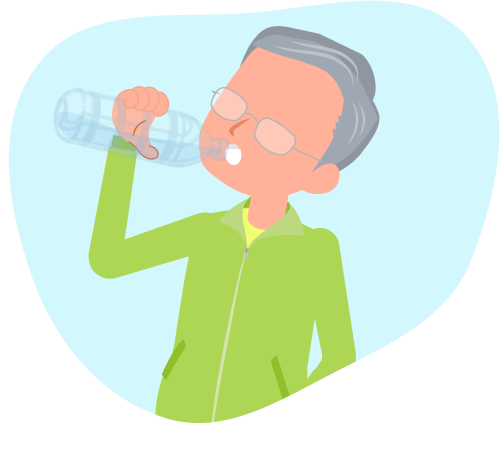
Important! Dialysis patients should follow the fluid regime designed by your nurse, dietitian or doctor.
Prevention of Anaemia
- Anaemia is common among dialysis patients as it is one of the complications of kidney failure.
- Erythropoietin (EPO), which prompts the bone marrow to make red blood cells, are produced by the kidney. When the kidney’s function is decreasing, the amount of EPO produced will be reduced.
- Other factors that cause anaemia among dialysis patients are:
- Reduced red blood cell lifespan due to accumulated urea toxic
- Malnutrition
- Lack of iron
- Lack of folate and other vitamins
- Blood loss during haemodialysis
- Symptoms of anaemia include fatigue, weakness, dizziness, headache, low immunity, breathless or shortness of breath, chest pain, reduced appetite, and pale looking.
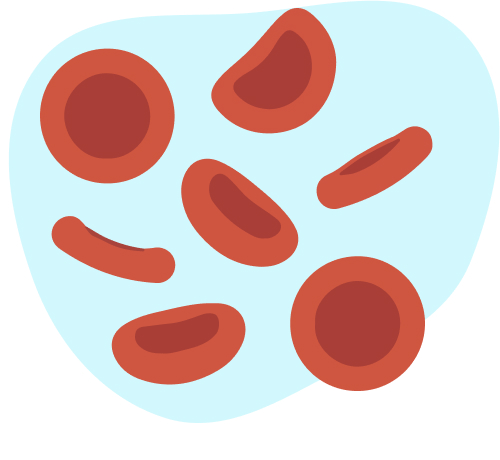
Tip! Adequate intake of protein, iron, vitamin C, vitamin B12 and folate are important in preventing and treating anaemia as these nutrients are the important elements in making new red blood cells.
*The above information and recommendations are general guidelines, and should not be viewed as specific advice for any individual. Please consult your doctor or other health care advisors for personal health decisions.





